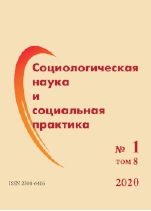Экологическое движение как фактор развития гражданского общества в Узбекистане
Аннотация
Литература
Вахбату З. Аль-фикхуль ислами ва адиллатуху (Исламская юриспруденция и её доказательства). Аль-жузу рабиъ. Т. 4. Бейрут, 1998.
Горбачева А. Ф. Ценности ислама и гражданского общества: потребность и возможность интеграции в современной России // Дискуссия. Журнал научных публикаций. 2011. № 10 (18). С. 118–126.
Ирригация Узбекистана в 4-х т. / АН УзССР. Совет по изучению производит. сил республики; Гл. ред. А. С. Садыков. Ташкент: Издательство «Фан», 1975-1981. Т. 1: Развитие ирригации в комплексе производительных сил Узбекистана / Отв. ред. чл.-кор. АН УзССР К. Н. Бедринцев и Б. Д. Коржавин. 1975. 350 с.
Кадыров А. От исторических мостов-вододелителей на р. Зарафшан до ИУВР (Интегрированного Управления Водными Ресурсами) / А. Кадыров; Отв. ред. В. И. Соколов. Ташкент: Vita Color, 2007. 68 с.
Ланг С., Хэртель А., Бюрш М. Гражданское общество и гражданская активность в России. Берлин: Фонд имени Фридриха Эберта, 2010. 25 с.
Мадаева, Ш. Религиозная идентичность женщин в традиционных махаллях современного Узбекистана: проблемы и пути их преодоления // Кыргызстан на современном этапе развития: Аналитические заметки: Гражданское общество, миграция, ислам, коррупция. Бишкек: ОсОО «Албино ЛТД», 2008. C. 141–146.
Маликов К. К., Усубалиев Э. Е. Мусульманская община Кыргызстана и политический процесс в стране: подходы к гармонизации отношений между государством и религией / К. К. Маликов, Э. Е. Усубалиев; отв. ред. Э. Е. Усубалиев. Бишкек: Изд. дом. «Принтхаус», 2009. 230 с.
Михайлова Е. В. Эволюция экологического предпринимательства в контексте социально-ориентированной экономики государства // Сервис в России и за рубежом. 2017. Т. 11. Вып. 7. С. 135–144. DOI: 10.22412/1995-042х-11-7-12
Моховикова М. Н. Государственные программы поддержки «третьего сектора» в Узбекистане // Вестник Моск. ун-та. Сер. 21. Управление (государство и общество). 2013. № 1. С. 65–87.
Моховикова М. Н. Взаимодействие государства и негосударственных некоммерческих организаций в Узбекистане: дис. на соиск. учен. степ. канд. полит. наук: специальность 23.00.02. «Политические институты, процессы и технологии» / Моховикова Мария Николаевна; Моск. гос. ин-т международных отношений. М., 2016. 218 с.
Назаров А., Авезов О. Формирование узбекского этноса // PEM: Psychology. Educology. Medicine. 2014. № 2. С. 119–124.
Население Узбекистана. 2019 // countrymeters: [сайт]. Электрон. дан. URL: https://countrymeters.info/ru/Uzbekistan (дата обращения: 11.09.2019).
Особенности национального воспитания в Узбекистане // CA-portal.ru Центральноазиатский портал: [сайт]. Электрон. дан. 06.10.2016. URL: http://www.ca-portal.ru/article:30300. (дата обращения: 25.10.2019).
Постановление Президента Республика Узбекистан. Концепция комплексного социально-экономического развития Республики Узбекистан до 2030 года. ID-8839 // regulation.gov. uz: [сайт]. Электрон. дан. URL: https://regulation.gov.uz/ru/document/8839. (дата обращения: 16.10.2019).
Сангинов С., Ибрагимов Р. Правовое поле деятельности ННО: по пути совершенствования // Экологическая безопасность и гражданская инициатива. 2008. № 9. С. 11–15.
Трифонова Г. А., Чувашенко И. А. Развитие экологического движения в России // Научные труды Дальрыбвтуза. 2008. № 20. С. 505–514.
Шубин А. Экологическое движение в СССР и вышедших из него странах (вступительная статья) // Экологические организации на территории бывшего СССР. Справочник. М., 1992.
Юдина М. А. Индустрия 4.0: перспективы и вызовы для общества // Государственное управление. Электронный вестник. 2017. № 60. С. 197–215.
Яницкий О. Н. Глобализация и гибридизация: к новому социальному порядку // Социологические исследования. 2019. № 8. C. 8–18. DOI: 10.31857/S013216250006132-8
Яницкий О. Н. Университет, профессура, студенческий экоактивизм: к истории студенческого природоохранного движения в СССР / РФ // Социологический журнал. 2015. Т. 21. № 2. С. 150–168.
Freudenberg N., Steinsapir C. Not in our backyards: The grassroots environmental movement // Society and Natural Resources. 1991. Vol. 4. № 3. pp. 235–245.
Поступила: 29.10.2019
Опубликована: 01.04.2020








 Издатель: Федеральное государственное бюджетное учреждение науки
Издатель: Федеральное государственное бюджетное учреждение науки